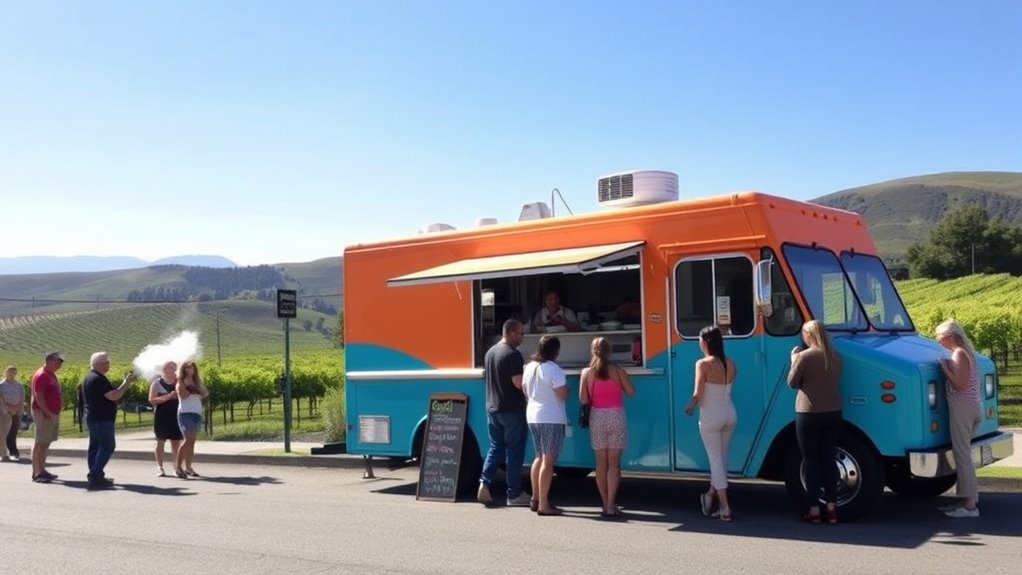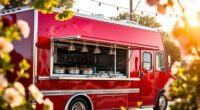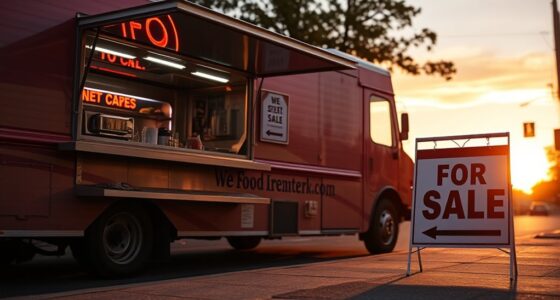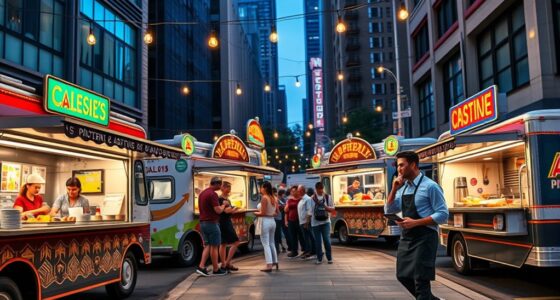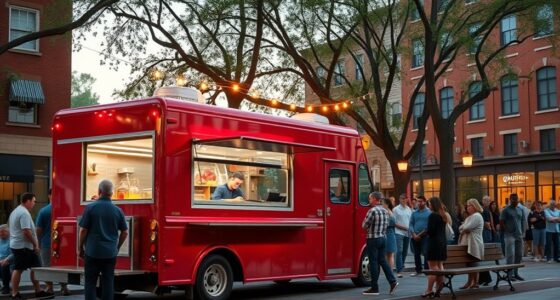To start a food truck in Santa Rosa, CA, you’ll need to navigate local regulations, secure permits, and find a suitable shared kitchen. Focus on building a strong brand with eye-catching visuals and community engagement—partner with local farmers, attend events, and connect with food bloggers. Budget for essential equipment and plan your menu wisely. Want to see how all these pieces can come together? Keep exploring for the full guide.
Key Takeaways
- Research Santa Rosa’s food truck permits, application deadlines, and approved locations to ensure compliance and smooth launch.
- Develop a unique brand identity with eye-catching visuals and local flavors to attract customers and build community loyalty.
- Secure necessary licenses, including health and shared kitchen permits, and establish reliable recordkeeping and sanitation routines.
- Create a detailed budget covering equipment, ingredients, and licensing costs; explore local funding options and partnerships.
- Implement targeted marketing via social media, local collaborations, and community events to increase visibility and sustain success.
Local Food Scene Overview
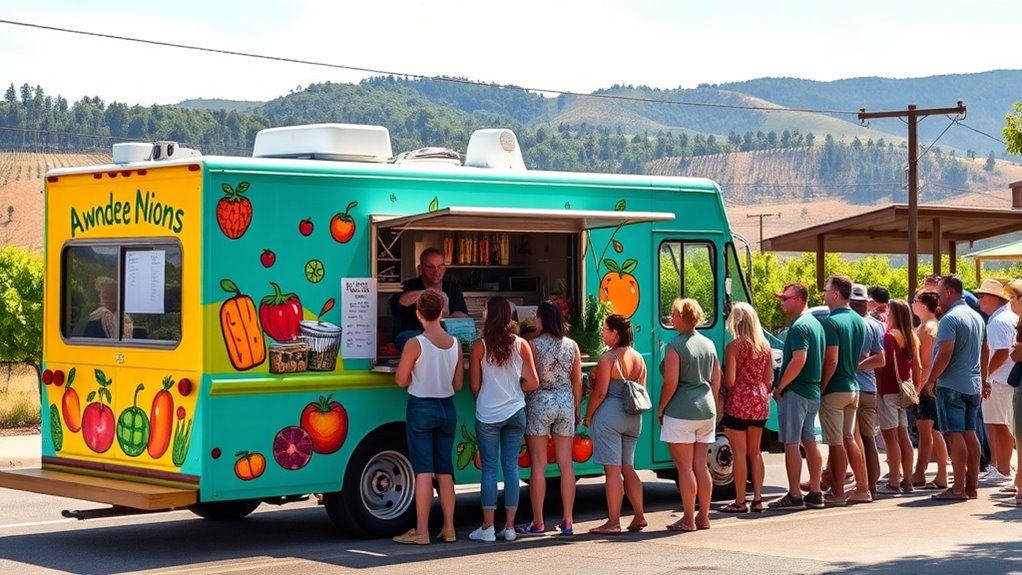
Have you ever wondered what makes Santa Rosa’s food scene stand out? It’s the vibrant mix of creativity and local flavors that set it apart. Food truck branding plays a key role in catching the eye of passersby, helping your truck stand out in a crowded market. Innovative menu options also attract loyal customers enthusiastic to try new twists on classic dishes. Santa Rosa embraces diverse cuisines, so your branding and menu should reflect your unique style while appealing to local tastes. You’ll find that standing out with eye-catching visuals and fresh, inventive offerings helps build a strong reputation. By focusing on standout branding and menu innovation, you can carve your niche in this dynamic, food-loving community. Additionally, understanding the importance of emotional alignment can help you connect more deeply with your customers and foster loyalty.
Understanding Local Requirements
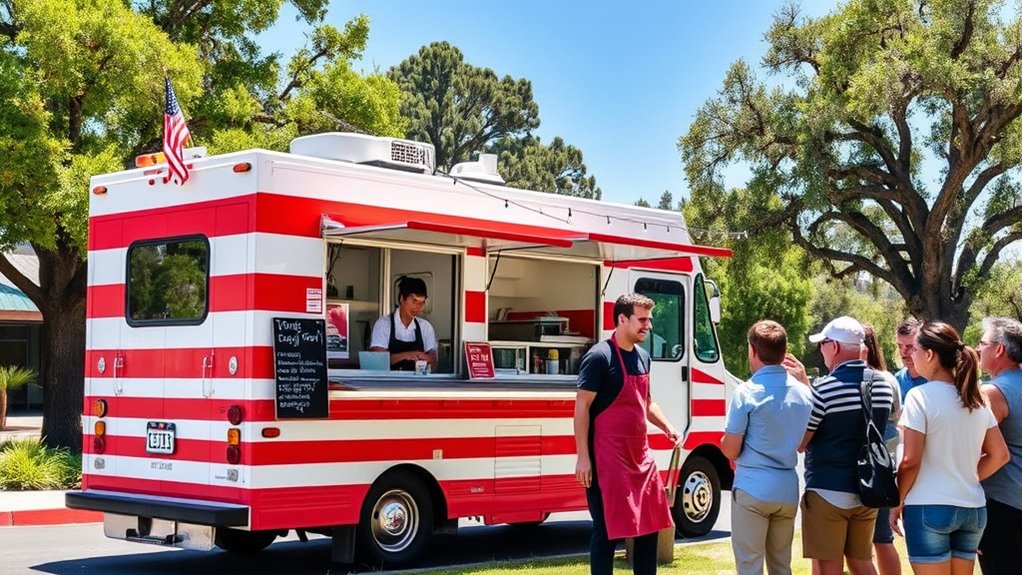
To get your food truck rolling in Santa Rosa, you need to know the application deadlines and approved locations. You also must meet sanitation standards and keep detailed records to stay compliant. Finally, familiarize yourself with designated parking zones to avoid penalties and guarantee smooth operations. Leveraging automation in business intelligence can further streamline your planning and operational decisions.
Application Deadlines and Locations
Are you aware of the specific deadlines and locations required to apply for a food truck permit in Santa Rosa? The application process has clear licensing deadlines you need to meet. You’ll want to check with the Santa Rosa city government to find out when applications are accepted and where to submit them. Typically, permits are issued at designated city offices or online portals, so knowing the correct location is vital. Missing the licensing deadlines can delay your start date, so plan ahead. Make sure you gather all necessary documents, such as proof of insurance and vehicle registration, before submitting your application. Staying organized and aware of the application timeline helps streamline the process, making it easier to get your food truck up and running smoothly.
Sanitation Standards and Recordkeeping
After securing your food truck permit and completing the application process, paying close attention to sanitation standards and recordkeeping becomes the next vital step. Food safety must be your top priority, so familiarize yourself with Santa Rosa’s health regulations for mobile food vendors. Maintain strict sanitation standards by regularly cleaning equipment, surfaces, and utensils, and ensuring proper waste disposal. Accurate record management is essential, so keep detailed logs of food temperatures, cleaning schedules, and employee health checks. These records not only help you stay compliant but also prepare you for inspections. Consistent documentation demonstrates your commitment to food safety and can prevent violations. Staying diligent with sanitation and recordkeeping ensures your food truck operates smoothly and safely within local requirements.
Designated Truck Parking Zones
Understanding Santa Rosa’s designated truck parking zones is essential for ensuring your food truck operates legally and efficiently. Local parking regulations and zoning ordinances specify where you can park your truck, helping you avoid fines or shutdowns. Santa Rosa designates specific areas for food trucks, often near commercial districts or special events. Always check signage and municipal maps before parking. Here’s a quick overview:
| Zone Type | Allowed Hours | Restrictions |
|---|---|---|
| Downtown Core | 7 AM – 10 PM | No parking during street cleaning |
| Commercial Districts | 6 AM – 11 PM | Limited to designated spots |
| Event Venues | During events only | Must have permit |
| Residential Areas | Not permitted | Zoning ordinances restrict parking |
| Public Parking Lots | 24/7 with permit | Follow posted signage |
Stay updated on local rules to keep your operations smooth.
Setting Up Your Base of Operations
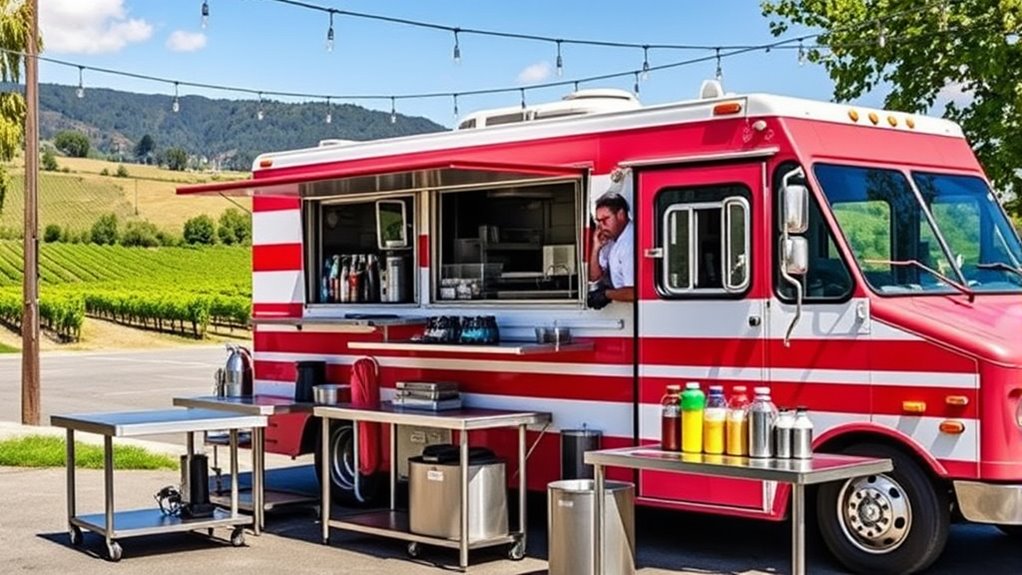
Choosing the right shared kitchen license options can save you time and money while meeting health regulations. Next, you’ll need to select custom kitchen equipment that fits your menu and space constraints. Making these decisions carefully sets a strong foundation for your food truck business in Santa Rosa. Additionally, understanding affiliate marketing disclosures can help you manage your online presence responsibly as you grow your brand.
Shared Kitchen Licensing Options
Setting up your food truck’s base of operations often involves utilizing shared kitchen spaces, which can be a cost-effective and flexible licensing option. Shared kitchens comply with local shared kitchen regulations and provide a ready-to-use facility without the expense of building your own commercial kitchen. These spaces typically offer multiple licensing options, making it easier to meet health and safety standards. Here’s a quick overview:
| Benefit | Consideration |
|---|---|
| Lower startup costs | Limited customization |
| Flexibility in location | Shared scheduling |
| Access to professional equipment | Compliance with shared kitchen regulations |
| Easier licensing process | Potential scheduling conflicts |
| Networking opportunities | Variable costs per use |
Shared kitchen licensing options streamline your setup, helping you start your food truck business faster.
Custom Kitchen Equipment Selection
Selecting the right kitchen equipment is a vital step in establishing your food truck’s operations. With custom kitchen equipment, you can tailor your setup to meet your specific menu and workflow needs. Focus on essential appliances like commercial-grade ovens, refrigerators, and prep stations that maximize efficiency and durability. When making equipment selection, consider space constraints and ease of cleaning to keep your operation smooth. Investing in quality, energy-efficient gear reduces long-term costs and guarantees reliable performance. Custom kitchen options allow you to optimize your layout for better workflow and safety. Remember, well-chosen equipment supports consistent food quality, faster service, and customer satisfaction. Take the time to research and choose equipment that aligns with your vision for your Santa Rosa food truck.
Budgeting and Financing Your Food Truck
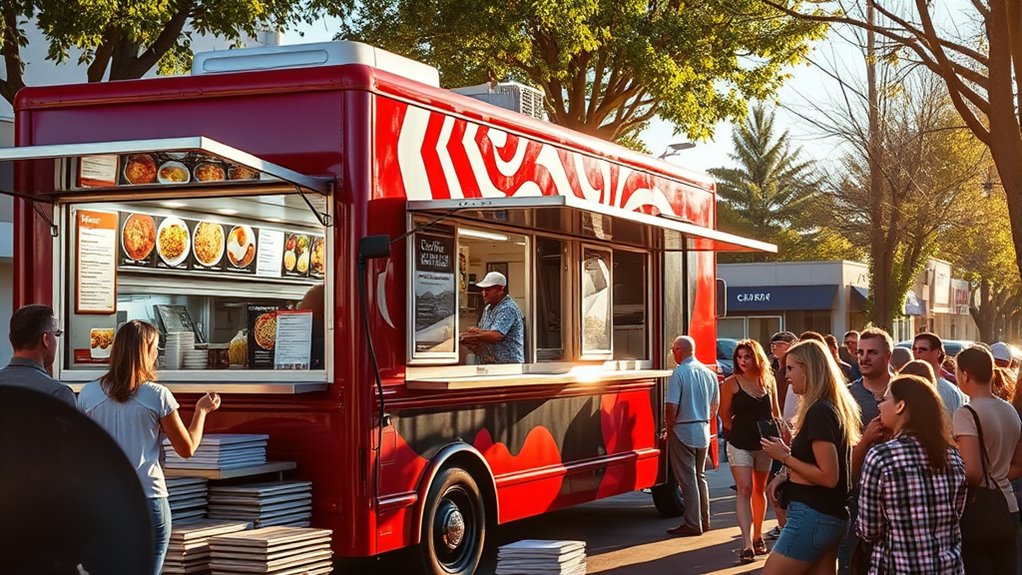
To start your food truck journey, you’ll need to plan for initial equipment costs and find reliable sources of startup capital. It’s also important to understand liability coverage and how to handle your tax obligations. Managing these financial aspects carefully sets a strong foundation for your business. Additionally, leveraging efficient general ledger coding can help you maintain accurate financial records and ensure compliance with financial regulations.
Initial Equipment Investment Costs
Understanding your initial equipment costs is essential for creating a realistic budget and securing financing for your food truck. The initial equipment includes cooking appliances, refrigeration units, serving counters, and necessary tools. These investment costs can vary depending on whether you buy new or used equipment and the size of your truck. To estimate your expenses accurately, research equipment prices and consider additional costs like installation and maintenance. Remember, quality equipment can impact your food quality and speed, so invest wisely. Keeping track of these initial equipment costs helps you avoid surprises and ensures you have enough funds to get your truck operational. Proper budgeting for these investment costs sets a solid foundation for your food truck business.
Startup Capital Sources
Securing startup capital is a crucial step in launching your food truck business, and there are several financing options to contemplate. Funding grants can provide non-repayable funds, especially if your business focuses on community or sustainable initiatives. These grants often come from local government programs or industry-specific organizations. Additionally, tapping into investor networks can help you gain the necessary capital; these networks connect you with individuals interested in supporting your food truck venture. You might also consider small business loans or personal savings, but exploring grants and investor opportunities can reduce your financial burden. Carefully researching and applying for funding grants, while networking with potential investors, will give you a solid financial foundation to start your food truck in Santa Rosa.
Liability Coverage and Tax Filing
Establishing proper liability coverage and managing tax obligations are essential steps in budgeting and financing your food truck. Liability coverage protects you from potential lawsuits or damages that could arise during operations, ensuring your business stays secure. You should work with an insurance provider familiar with food trucks to get the right liability coverage tailored to your needs. Simultaneously, staying on top of tax filing requirements is vital to avoid penalties and maintain good standing with tax authorities. Keep detailed records of your income, expenses, and receipts to simplify this process. Proper liability coverage and accurate tax filing not only help you stay compliant but also provide peace of mind, allowing you to focus on growing your Santa Rosa food truck business confidently.
Designing Your Menu and Pricing Strategy
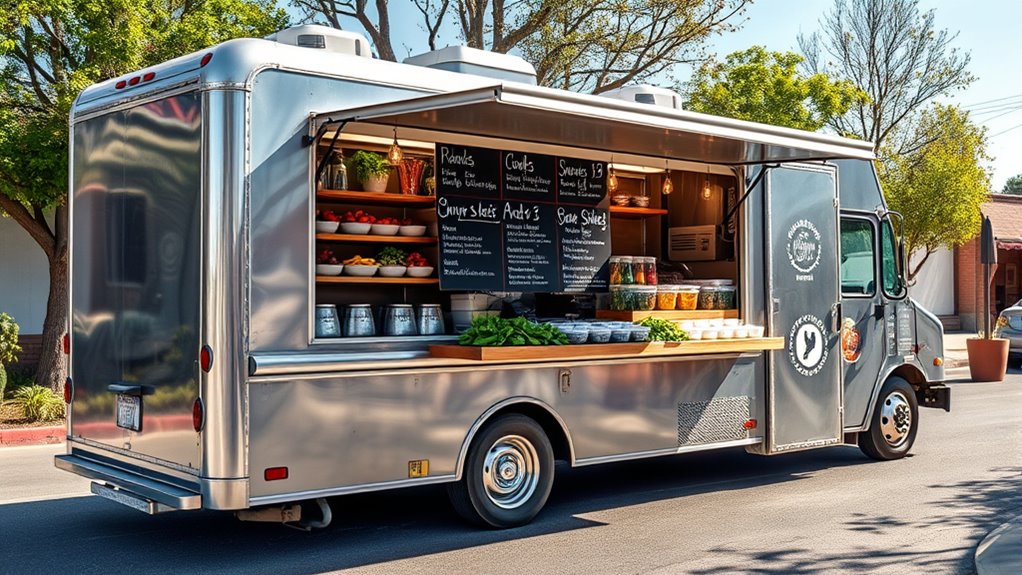
Choosing the right ingredients and pricing your menu effectively can make or break your food truck’s success. By sourcing locally, you can reduce costs and guarantee fresh flavors that appeal to customers. Keep a close eye on ingredient expenses to set prices that cover costs while keeping your offerings competitive.
Local Ingredient Sourcing Strategies
In designing your menu and pricing strategy, sourcing ingredients locally can give your food truck a distinct edge by highlighting freshness and supporting the community. Focus on sourcing organic produce and other ingredients from nearby farms to guarantee quality and flavor. Supporting local farmers not only benefits your reputation but also helps maintain a sustainable supply chain. Establish relationships with farmers markets and farm stands in Santa Rosa to access seasonal, fresh ingredients. This approach allows you to craft dishes that reflect the region’s flavors while appealing to health-conscious customers. By prioritizing local sourcing, you can differentiate your menu, justify premium pricing, and build a loyal customer base that appreciates your commitment to community and quality.
Ingredient Cost Control Techniques
To effectively control ingredient costs, you need to carefully design your menu and set your pricing strategy around your ingredient expenses. Start by choosing menu items that optimize ingredient pricing and allow for consistent portion control. This helps prevent waste and ensures profitability. Focus on dishes that use similar ingredients to streamline inventory and reduce unnecessary purchases. Establish portion control standards to maintain consistency and prevent over-serving. Regularly review ingredient costs and adjust your menu prices accordingly to stay profitable. Consider offering combo meals or specials that maximize ingredient use without increasing costs. By balancing menu design with strategic pricing and portion control, you can keep ingredient costs in check while providing appealing options to your customers.
Technology and Operations

Using the right wireless card reader can speed up your checkout process and reduce errors. You might also consider a mobile app to keep track of inventory in real-time, so you never run out of essentials. These tools help keep your food truck’s operations smooth and efficient. WWE Raw’s financial impact highlights how entertainment technology can generate billions, emphasizing the importance of investing in reliable equipment.
Wireless Card Reader Options
Wireless card readers have become essential for food trucks looking to streamline payment processes and enhance customer experience. They enable quick, secure transactions, supporting cashless payments and mobile POS systems that keep lines moving smoothly. When choosing a wireless card reader, consider these options:
- Square Reader: Compatible with smartphones, easy to set up, and supports multiple payment types.
- SumUp: Affordable, reliable, with integrated contactless and chip card acceptance.
- Clover Go: Offers robust features, customizable options, and seamless integration with other Clover devices.
These options help you accept payments quickly, improve operational efficiency, and meet customer expectations for convenience. Investing in the right wireless card reader is a smart move toward a modern, customer-friendly food truck operation.
Mobile App for Inventory Tracking
Implementing a mobile app for inventory tracking can transform your food truck’s operations by providing real-time updates on stock levels and simplifying order management. With an effective inventory management mobile app, you can easily monitor ingredients, supplies, and sales data from your smartphone or tablet. This technology helps prevent stock shortages and reduces waste by alerting you when items run low. It also streamlines ordering processes, ensuring you restock efficiently without overordering. By using a dedicated mobile app, you gain better control over your inventory, save time, and minimize errors. This automation allows you to focus more on preparing great food and serving customers. Overall, a mobile app for inventory management is essential for maintaining smooth, organized, and profitable food truck operations.
Marketing and Growing Your Presence

You can boost your food truck’s visibility by participating in popular local events that draw crowds. Connecting with local food bloggers and influencers also helps spread the word about your offerings. Together, these strategies can help grow your presence and attract more customers in Santa Rosa.
Popular Local Event Schedules
To effectively boost your food truck’s visibility in Santa Rosa, participating in popular local events is essential. Familiarize yourself with the city’s event schedules, especially food truck festivals and community gatherings. These events attract large crowds and provide perfect opportunities for social media marketing to reach new customers. By aligning your truck with these events, you enhance brand recognition and generate immediate sales. Stay updated on event calendars through local websites or social media pages. Planning ahead guarantees you secure a spot and prepare accordingly. Engaging with event organizers and other vendors can also expand your network. Remember, consistent participation in these schedules helps build a loyal customer base and keeps your food truck top of mind in Santa Rosa’s vibrant scene.
Engaging Local Food Bloggers
Engaging local food bloggers can substantially boost your food truck’s visibility and credibility in Santa Rosa. By building relationships with these influencers, you can enhance your food truck branding and reach a broader audience. Invite bloggers to try your offerings and share their genuine experiences on social media outreach platforms. Their positive reviews and photos can attract new customers and create buzz around your truck. Focus on creating shareable content that highlights your unique menu and the story behind your truck. Consistent engagement with local bloggers also helps you stay connected to community events and trends. This strategy not only builds trust but also positions your food truck as a go-to spot in Santa Rosa. Ultimately, it’s about turning influencers into your brand ambassadors.
Local Community Support Strategies

Building strong ties within the Santa Rosa community is essential for the success of your food truck. You can do this by forming community partnerships with local businesses and organizations, which helps boost visibility and trust. Seek out local sponsorships to support community events or charity fundraisers; this illustrates your commitment to the area. Participating in neighborhood events or farmers’ markets also strengthens your presence. Engaging directly with residents creates loyalty and word-of-mouth buzz. Consider collaborating with local farms for fresh ingredients, reinforcing your community connection. These strategies foster goodwill, expand your customer base, and establish your food truck as a valued part of Santa Rosa’s vibrant scene. Building these relationships is a key step toward sustainable success.
Frequently Asked Questions
What Permits Are Required Specifically for Mobile Food Vendors in Santa Rosa?
In Santa Rosa, you’ll need a vendor license and health permits to operate your food truck. Make sure you follow parking regulations, as restrictions vary by area, and you could face fines if you don’t comply. You’ll also need to register your vehicle and obtain any necessary local permits. Contact the Santa Rosa city office to get specific details, ensuring you meet all licensing and parking requirements for a smooth start.
Are There Any Local Health Regulations Unique to Santa Rosa Food Trucks?
Santa Rosa’s health regulations are like a fortress guarding your food truck’s reputation. You’ll need to pass rigorous local health inspections and adhere to sanitation standards that keep your food safe and delicious. Santa Rosa emphasizes cleanliness and proper food handling, so you’ll want to stay on top of their specific guidelines. Following these rules isn’t just smart; it’s essential for success in this vibrant food scene.
How Do I Find Approved Parking Locations for My Food Truck?
You can find approved parking locations for your food truck by researching Santa Rosa’s parking regulations and zoning laws. Start with city websites and local business districts for permitted areas. Contact Santa Rosa’s city planning or licensing departments for specific guidelines. Scouting locations in person helps identify high-traffic spots, and talking to local businesses can reveal partnership opportunities. Always verify if special permits or time restrictions apply to your chosen parking spots.
What Are the Best Local Events to Participate in for Food Truck Exposure?
Did you know that over 70% of food truck owners find community markets and food festivals boost their exposure? You should participate in local events like Santa Rosa’s Food Festival or community markets, where crowds gather for unique flavors. These events offer great networking opportunities, increase your visibility, and help build your customer base quickly. Be proactive, get involved early, and watch your food truck thrive in Santa Rosa’s vibrant scene.
Are There Any Santa Rosa Business Grants or Incentives for Food Truck Entrepreneurs?
Yes, Santa Rosa offers food truck grants and entrepreneurial incentives to support your business. You can explore local government programs, such as small business grants or community development funds, which may provide financial assistance. Additionally, check with the Santa Rosa Chamber of Commerce or the California Small Business Development Center for resources and guidance on securing food truck grants and incentives that can help you launch and grow your food truck venture successfully.
Conclusion
Starting a food truck in Santa Rosa is an exciting venture, but it takes more than just good food to succeed. By understanding local rules, crafting a standout menu, and engaging with the community, you’ll set yourself up for success. Think of it as planting seeds—you’ll need patience and effort to see your business flourish. Stay focused, adapt along the way, and before you know it, you’ll be cooking up a storm in this vibrant city.
